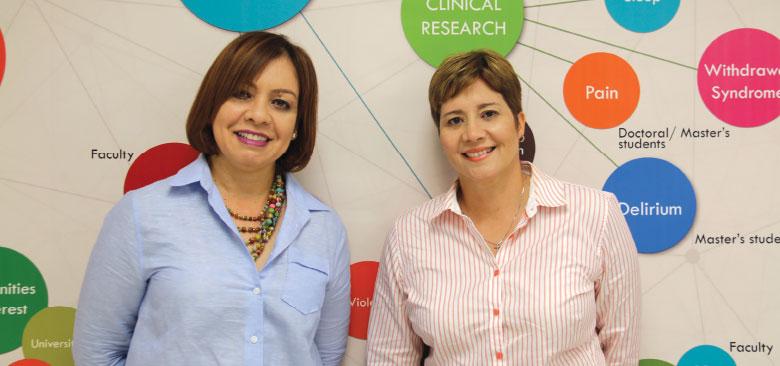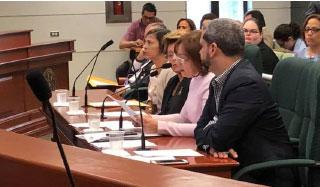
Milagros Figueroa-Ramos (left) and Carmen Mabel Arroyo-Novoa
Alums Strive to Bring Family Presence to Puerto Rico ICUs
For much of 2018, the Puerto Rico legislature has been working to address the terrible toll Hurricane María exacted on the island in the fall of 2017. But as things slowly return to normal, some legislators in the House of Representatives of Puerto Rico have turned their attention to a bill they proposed before the hurricane, one aimed at allowing families to be present with their loved ones throughout the day in adult, pediatric and neonatal intensive care units (ICUs).
This is not typically the type of concern that comes under the purview of the legislature, and the story of how it came to be so has roots in a decades-long collaboration between the UC San Francisco School of Nursing and the University of Puerto Rico, Medical Sciences Campus (UPRMSC), School of Nursing – and in both schools’ commitment to the broad professional development of nurses.
A Meeting of the Minds
In the early 2000s, William Holzemer – then a professor at the UCSF School of Nursing and now dean of the Rutgers School of Nursing – garnered a five-year grant from the National Institutes of Health that brought the UCSF and UPRMSC Schools of Nursing together to establish the Nursing Research Center on HIV/AIDS Health Disparities. This center funded pilot studies that paired a UPR researcher with a UCSF researcher to enhance the research capacity of UPRMSC School of Nursing faculty. This collaboration between the schools resulted in published manuscripts, presentations and new grants – and also made it possible for UPRMSC School of Nursing faculty to conduct postdoctoral and doctoral studies at UCSF.
Critical care experts Milagros Figueroa-Ramos and Carmen Mabel Arroyo-Novoa were two of those UPRMSC School of Nursing faculty, with both receiving their PhD degrees in 2010 from the UCSF School of Nursing. Figueroa-Ramos worked with Kathryn Lee and Kathleen Puntillo and focused her doctoral work on sleep and delirium in critical care; Arroyo-Novoa focused on pain in the ICU and worked with Kathleen Puntillo. Currently, Figueroa-Ramos is associate professor and assistant dean for research and Arroyo-Novoa is associate professor and director of the doctoral program at the UPRMSC School of Nursing.
“Even though the particular phenomena we were researching weren’t necessarily about family presence, we were very much aware of its importance in helping patients deal with pain and delirium,” says Figueroa-Ramos.
“We saw this policy [families invited into ICUs] instituted in the hospitals where we worked, and we saw how important family was to patients’ rehabilitation and healing,” says Arroyo-Novoa.
Wrestling with a Long-Standing Policy
In Puerto Rico, however, nearly all hospitals have policies that restrict family visitation for adult, pediatric and neonatal ICUs to a half or full hour, twice a day. Over the past few years – backed by years of research that demonstrates the benefits of family presence, and small tests of change they helped promote with their students in select ICUs in Puerto Rico – Figueroa-Ramos and Arroyo-Novoa joined with clinical colleagues and their students to press hospitals to change these policies. One private hospital joined the Society of Critical Care Medicine’s ICU Liberation Initiative – for which Figueroa-Ramos and Arroyo-Novoa were the Puerto Rican delegates and which recommends allowing for the presence of families in the ICU around the clock – and documented positive results.
“But we could never get any sort of movement on the part of hospitals to establish new policies,” says Figueroa-Ramos. “We felt our hands were tied and that the legislative route was the only way to provoke change for the betterment of patients.”
So the two nurse-scientists joined with other clinicians supported by the board of the Puerto Rico Society of Critical, Intensive, and Coronary Care Medicine to wrangle a meeting with Rep. José Enrique Meléndez Ortiz of the House of Representatives of Puerto Rico.
 Figueroa-Ramos (front row, second from right) presents findings to the House of Representatives of Puerto Rico. “We presented our findings from the literature and from anecdotal evidence of what was happening at the unit level,” says Figueroa-Ramos. “He asked us to go ahead and work on something that he could take to the legislature.”
Figueroa-Ramos (front row, second from right) presents findings to the House of Representatives of Puerto Rico. “We presented our findings from the literature and from anecdotal evidence of what was happening at the unit level,” says Figueroa-Ramos. “He asked us to go ahead and work on something that he could take to the legislature.”
In July 2017, Meléndez Ortiz presented the legislation, with co-sponsorship from the chair of the Commission on Health of the House of Representatives and the speaker of the house. Figueroa-Ramos and critical care pediatrician Ricardo García-De Jesus from the UPRMSC School of Medicine spoke in favor of the legislation in front of the committee.
There was some pushback, however, mostly from the Puerto Rico Department of Health and the Puerto Rico Hospital Association, both of which raised concerns about space and patient privacy.
“But the problem they had was that other units, like the emergency department, function fine with family presence,” says Arroyo-Novoa. “The representatives seemed very skeptical of their arguments, and we got the sense that the hospitals were objecting more to the culture change than anything else. We think even they believe it’s a good idea to have families present.”
Then, just as momentum was gathering to pass the bill, María hit the island, and all legislation took a back seat to hurricane recovery. Even as of this writing, there are still occasional blackouts, but both nurse-scientists say that hospitals have been a priority and are largely back to business as usual. And as the island regains some sense of normalcy, Figueroa-Ramos and Arroyo-Novoa are hoping to see the legislation pass both legislative chambers over the next few months.
“It’s been quite a year, but it’s nice to know we’ve gotten to this point where we have a real possibility for changing the ICU culture in Puerto Rico, because family is a key element for obtaining better patient outcomes,” says Figueroa-Ramos. “And for me, maybe the best part has been having our students see nursing in a different light as we have undertaken this challenge.”



